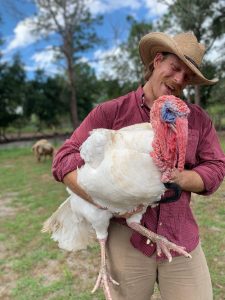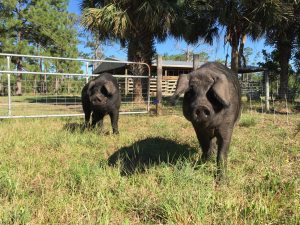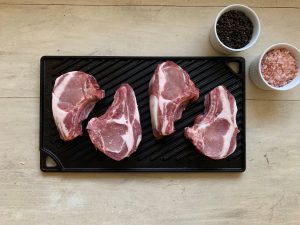We’re excited to share the next installment in our “Interview with a Farmer Series”, where we talk to some of our local Indian River County farmers and producers to learn more about their operations, what it’s like to be a farmer, and what we can do as consumers to support local agriculture.

November is a time for giving thanks and, of course, for eating delicious food. That makes it the perfect time to recognize and celebrate all our local farmers, who work tirelessly to ensure that we can put food on our tables.
If you’ve ever wondered about the people behind your food, you’re in for a treat as we uncover the heart and soul of local agriculture in Indian River County. Join us for a new post each week throughout the month of November. In this post, we hear from Elizabeth and Jake Fojtik of Fojtik Flatwoods Farm…
Can you tell me a little bit about your farm or operation?
Fojtik Flatwoods Farm (F3) is a family farm located in Fellsmere, Florida. The ‘F3’ represents 3 generations of Fojtik’s working together. We are a husband and wife team, along with Jake’s dad (Brad Fojtik) and our children. We raise heritage breed, pasture raised pork, and pastured poultry (chicken and turkey), focusing on direct-to-consumer sales within Indian River County.

How did you get started in farming?
Our farming story starts long before F3, back in college, at Sewanee: The University of the South, where we met in an Environmental Education class and ended up volunteering and interning together at the University Farm. When we graduated, Jake came back to his hometown of Vero Beach. We wanted to know where our meat came from, so we started with a small backyard flock of laying hens, added a few meat chickens, and a couple Thanksgiving turkeys. The farm continued to grow as our family and friends wanted to support our small business, and we were eager to share clean and nutritious food with them. We ran out of room in our backyard and decided to make the leap and move out to Fellsmere for some more space. Here we have been able to develop a pasture rotation system that incorporates the foraging habits of our chickens, pigs, and cows, benefiting both livestock and land.
In your opinion, what is the best or most rewarding part of your job? What is the most challenging part of your job?
The most rewarding part of our job is putting food on the table for our community, knowing it was raised in a healthy and humane way, good for the animal and our environment. The most challenging part of our job is the commitment. Farming is more than a job; it is a lifestyle. No matter how we are feeling, our plans with friends and family, holidays, or bad weather, you will find us outside each and every day caring for our animals.
What does a typical ‘day in the life’ look like for you?
There are no ‘typical days’ on the farm, although we do have chores that we complete every day. Daily chores include feeding and watering the meat chickens, laying hens, pigs, and cows, moving

the meat chicken mobile coops, checking electric fence lines for the pigs, and milking our family dairy cow. Depending on the season, our other projects could be mowing pastures, picking up feed from a local mill, building or fixing fences, or processing chickens. There is always something to be done around the farm!
What is something you wish more people understood about farming?
There is no ‘right way’ to grow food! Agricultural practices depend on a wide variety of factors such as soil types, weather conditions, climates, and even the variety of crop or breed of animal. What works on one farm may not work on another. Good faith farmers and ranchers are making decisions to be the best stewards of the land as their livelihood depends on it.

What is something easy that people can do to help support local agriculture?
Educate yourself about what food is local to you and when the growing season is! Try to purchase food grown locally first, and if not available, purchase products grown in Florida. You can look for the “Fresh from Florida” label at the grocery store. Every dollar has an impact, so try your best to spend it locally.
Another way to support local agriculture is to consider joining your local Farm Bureau chapter. You don’t need to be a farmer to join, and your membership helps to support Florida agriculture by ensuring the future of family farms, natural resource conservation, and locally grown food. There are also a bunch of great membership perks!
Is there anything else you’d like to share?
If you’d like to know more, you can find us on the web at www.fojtikflatwoodsfarm.com.
 2
2
